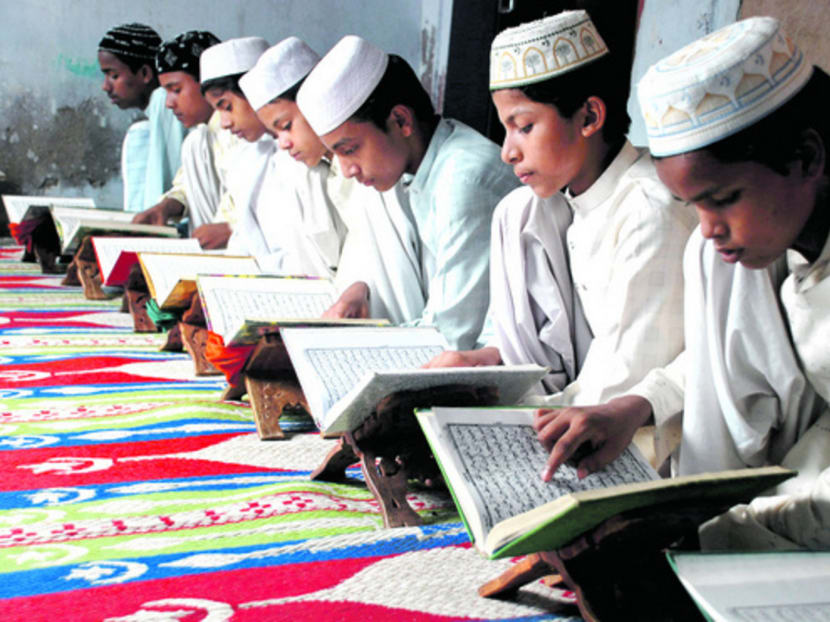India’s crackdown on madrasahs exposes rift over Islamic education
MUMBAI — A demand by the Indian state of Maharashtra that the hundreds of madrasahs there teach mathematics and science as well as Quranic studies has exposed the deepening rift in South Asia between supporters and opponents of Islamic education.

Muslim children reading the Quran at a madrasah in India. Some Indian Muslim leaders have accused the BJP of pursuing a fundamentalist Hindu agenda with the crackdown on madrasahs. Photo: REUTERS
MUMBAI — A demand by the Indian state of Maharashtra that the hundreds of madrasahs there teach mathematics and science as well as Quranic studies has exposed the deepening rift in South Asia between supporters and opponents of Islamic education.
Mr Eknath Khadse, the state’s Minority Affairs Minister, last week stoked a heated debate across India when he said madrasahs that did not teach mainstream subjects would be considered “non-schools”, meaning they failed to comply with education laws and were not eligible for state funding.
Maharashtra, of which Mumbai is the capital, conducted a survey to determine which schools in the state of 117 million people teach the regular curriculum. About 148,000 Muslim students attend the state’s 1,889 registered madrasahs. Some teach maths and science, as well as Islam, and receive official funding. But there are also believed to be thousands of unregistered madrasahs.
Some Indian Muslim leaders were angered by the latest moves and accused the Hindu nationalist government of Prime Minister Narendra Modi — and the Maharashtra government led by his Bharatiya Janata Party (BJP) — of pursuing a fundamentalist Hindu agenda.
Two months ago, the state government banned the sale and eating of beef because cows are sacred to Hindus, depriving thousands of Muslims of a source of work and food.
“This is a continuous targeting of Muslims by the Maharashtra BJP government,” said Mr Asaduddin Owaisi, a Muslim leader and Member of Parliament (MP) for Hyderabad. “This whole contention that they are bringing the Muslims into the mainstream is bogus.”
He accused the authorities of hypocrisy for refusing to support reserved places for underprivileged Muslims in formal education, while simultaneously attacking madrasahs that catered to only 2 per cent of the Muslim minority.
While the primary aim of madrasahs was to train Islamic scholars, he said, many nevertheless taught English, maths and science, and some students went on to become civil servants, lawyers and doctors.
On Friday, clusters of teenage boys in white skullcaps sat silently reading on the marble floors of the Darul Uloom Imdadia Madrasah, waiting for the call to midday prayers from a nearby mosque on Mohammed Ali Road, the bustling heart of southern Mumbai’s main Muslim district.
“Lots of people are studying here, it provides a good education,” said Mr Farid Ahmed Shailah, a local merchant selling herbal medicines from a small shop outside the madrasah’s front gate.
“The government is not providing schools for Muslims, and education is very expensive here,” he added. “Instead of making it harder for them, maybe they should help?”
Mr Zahid Shahab, the owner of the nearby Maktaba Islami bookshop, agreed. Sitting at his desk behind a stack of Qurans, he said local Muslims were sceptical of the intentions of Mr Modi and the BJP.
“At first, I thought Modi was good, but I don’t understand why he is doing this at all,” he said.
BJP leaders, however, are unrepentant, arguing that they are merely implementing the Right to Education law enacted by the previous administration of the secular Congress party.
“We are trying our best to encourage all these institutions to join mainstream education,” said Mr Mukhtar Abbas Naqvi, Minister of State for Parliamentary Affairs. “Religious education alone cannot help these boys and girls join the mainstream of progress.”
Mr Milind Deora, a former Mumbai MP for Congress, said the BJP’s statements seemed to have a “political subtext” that would alarm not only Muslims, but also people of other minority religions who run schools around India.
“In south Mumbai, the Muslims have schools, but so do the Christians, the Jains, the Sikhs, the Parsis,” he said.
“They all run educational institutions, and it is foolish to say we will work with one and not the other. You have to work with all of them to help them improve,” Mr Deora added.
THE FINANCIAL TIMES





